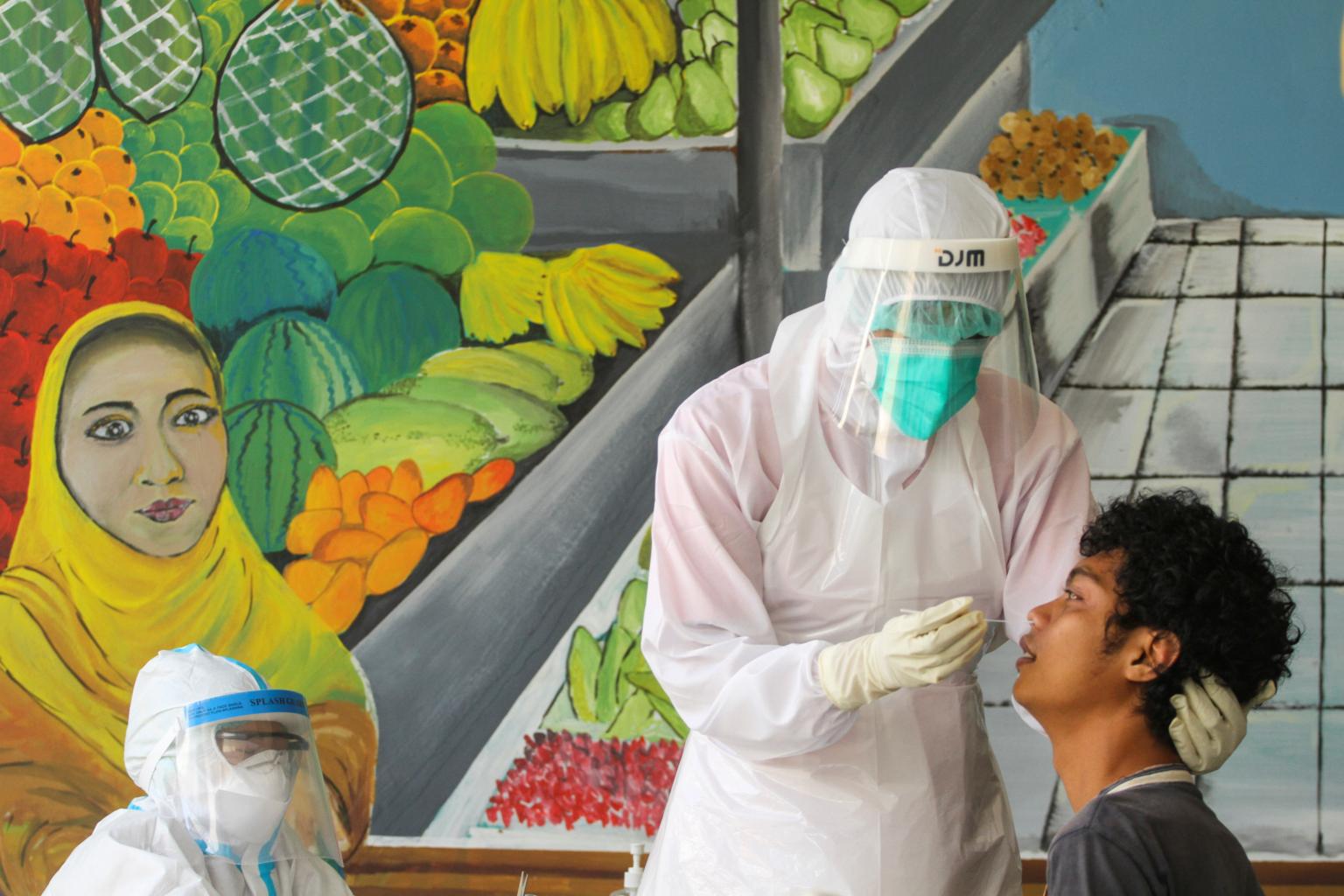Editorial Notes
Easing lockdown restrictions, but at what cost?: Jakarta Post
In its editorial, the paper says that rather than being forced to march into the unknown, Indonesia's young people deserve incentives and support to continue working from home.
Sign up now: Get insights on Asia's fast-moving developments

Healthcare workers take a swab sample from a vendor at a traditional market in Depok, near Jakarta, on May 16, 2020.
PHOTO: REUTERS
JAKARTA (THE JAKARTA POST/ASIA NEWS NETWORK) - State-owned firms will resume operations in a "new normal" and a guideline is being prepared, which State-Owned Enterprises (SOEs) Minister Erick Thohir says will need the consent of the national Covid-19 taskforce.
SOE employees are among those specifically banned from participating in the Idul Fitri tradition of mudik (exodus) because of the Covid-19 outbreak.
One of the possible scenarios of the new normal is that only those under 45 years old will be expected to show up for work - unless the employees live in areas where large-scale social restrictions (PSBB) are in effect.
But the scale of the outbreak in the country remains deeply uncertain.
Official numbers may systematically understate its severity, and people continue to head home ahead of the holidays as new clusters of suspected cases emerge with little hope of sufficient contact tracing.
The responsible measure for the government would be to prepare for the resumption of businesses without risking further infection.
Businesses have said they are not at all enthusiastic about returning to normalcy soon, having witnessed too many violations of physical distancing rules.
As Shinta Kamdani, deputy head of the Indonesia Chamber of Commerce and Industry (Kadin) has said, the risk of further contagion and deaths brought about by easing restrictions on travel, even for "essential" business purposes, will "prevent market confidence in Indonesia from recovering as easily and will make it more difficult to allow the economy to run as usual."
That's the key word: confidence. We must feel confident that the government is properly addressing public health before focusing on the economy.
As it stands, we are not if sure if we have reached the peak of Covid-19 cases in the country as the government claims.
Record daily increases in confirmed cases were seen last week, and a significant lack of testing has fuelled doubts in business circles and citizens.
The government is ramping up the number of daily swab tests to better determine the spread of the outbreak, but scenes of large groups ignoring physical distancing, such as at Sukarno-Hatta International Airport recently, are disheartening.
On May 15, the SOEs Ministry proposed protocols to safeguard employees, customers, suppliers, partners and other stakeholders during the reopening of business.
In addition to requiring hygiene maintenance and safe interpersonal distances, the protocols restrict the number of company branches allowed to operate in certain industries, as well as the number of employees allowed to return and the hours they can work.
In a bid to keep the economy running and minimise layoffs, certain services, including restaurants and retail outlets, will resume on June 2, reports have said, followed by tourism and education on June 8 - all with strict protocols depending on local restrictions.
On June 29, all economic sectors are slated to reopen, and the scope of business will be widened in mid-July, followed by evaluations.
Official data shows that those under 45 make up a small portion of confirmed cases, especially compared to those over 60.
But rather than being forced to march into the unknown, our young people deserve incentives and support to continue working from home.
The Jakarta Post is a member of The Straits Times media partner Asia News Network, an alliance of 24 news media organisations.


